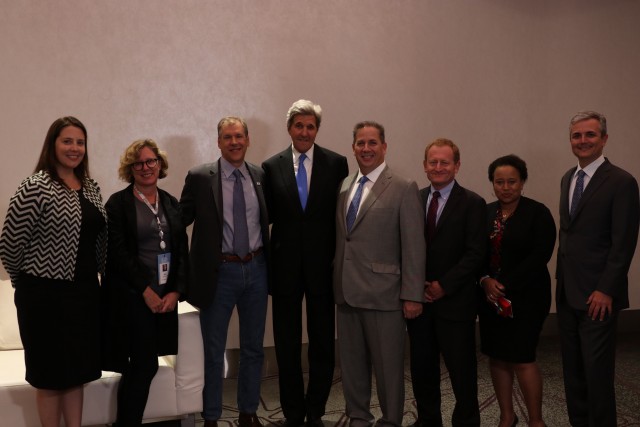NEWS Climate Action Summit: dialog with former Secretary of State John Kerry on carbon pricing
At the Global Climate Action Summit one of the interesting events was a multi-university summit on carbon pricing. Yale University, Smith College, Swarthmore College, and both myself and Prof. Ann Carlson from UCLA participated in a discussion about the challenges and opportunities to price externalities in university actions.
Caption: Prof. Ann Carlson (second from left), Dan Kammen, (third from left), next to former Secretary of State John Kerry, Kammen’s former ‘boss’ when he served as Science Envoy, along with colleagues from the World Bank, Smith College and Swarthmore College.
On Sept. 13, the summit hosts “Higher Education Leadership on Carbon Pricing,” an event focused on the experiences of Yale and other schools in implementing internal carbon pricing on campus. Former U.S. Secretary of State John Kerry will speak at the event, which also will include Yale Carbon Charge director Casey Pickett and Yale Associate Vice President for Strategy and Analytics Tim Pavlis.
At the event, representatives from Yale, Swarthmore College, the nonprofit group Second Nature, and the Carbon Pricing Leadership Coalition will unveil a Higher Education Carbon Pricing Toolkit. It is the most comprehensive compilation of existing tools for implementing internal carbon pricing on college and university campuses.
“When I share Yale’s approach to carbon pricing, people often ask, ‘How does it work? What options are there for my institution to put a price on carbon emissions?’ This toolkit begins to answer those questions,” Pickett said.
Carbon pricing refers to the idea of placing an extra charge on products or services based on the amount of carbon they emit. Hundreds of businesses, private universities, and other institutions — including Yale — now have some version of a carbon pricing program in place.
Yale has taken a leadership role in exploring different approaches to carbon pricing and sharing its findings. In 2017, Yale became the first university to implement a financially impactful fee on carbon emissions for more than 250 buildings and 70% of carbon dioxide emissions on campus.

“Since Yale began experimenting with internal carbon pricing through our pilot study, six other higher education institutions have implemented carbon pricing mechanisms,” Pickett said. “Each works a bit differently. There is much to learn from carbon pricing experiments in different contexts.”
The best practices regarding carbon pricing that Yale has accumulated are part of the new toolkit, which includes case studies, communication guides, and data management tools.
The Yale Carbon Charge idea originated with economics professor Bill Nordhaus, who developed the “social cost of carbon” concept, an estimate of the cost of global damages from an additional ton of carbon dioxide emitted. After Nordhaus suggested the value of having an internal carbon charge, a group of Yale students advanced the idea.
Yale President Peter Salovey organized a Presidential Task Force to study the idea. The task force recommended testing a pilot project, which began in the fall of 2015.
“We must incorporate the social costs of our emissions into our economic choices,” Pavlis said. “When we don’t pay a price for carbon emissions, everyone pays the cost.”

You must be logged in to post a comment.